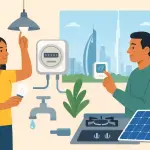A new study in Dubai has shown that robot teachers using artificial intelligence (AI) can help young students learn better. The research, done by Rochester Institute of Technology (RIT) in Dubai, found that students who learned with the help of an AI-powered robot improved their academic performance by an average of 8% compared to students taught by only human teachers.
How the Study Was Done
The research team was led by Dr. Jinane Mounsef, head of the Electrical Engineering and Computing Sciences Department at RIT Dubai. They tested a smart robot named Duet, designed to teach primary school students.
This robot used:
- Machine learning algorithms to study how students learn
- Robot Operating System (ROS) to run its programs
- Student data, like test scores and emotional reactions, to adapt lessons in real time
The robot could predict a student’s skill level with 100% accuracy. Based on this, it changed the difficulty of lessons and picked the right learning materials for each student.
“Students using the AI-robot system performed much better than those without it,” said Dr. Mounsef. “This proves AI can help improve learning in a real classroom.”
She also said the team will explore using robots for emotional support, where future robots may look more human and ask questions to understand how students feel and offer helpful feedback.
Experts Support the Idea—with Caution
Education experts in the UAE welcome the use of robots in early learning, but they say it should be done carefully.
Shifa Yusuffali, founder of IdeaCrate and MENALAC board member, said we must be thoughtful when bringing AI into classrooms. She pointed out that studies from Cambridge University and MIT Media Lab show that robots can help children learn teamwork and thinking skills, even from the age of four.
But she also warned that technology should never replace real human interaction.
“Technology should follow a child’s natural curiosity—not lead it,” she said. “Children need to move, explore, and connect with others. Robots can help, but they should not take over.”
Yusuffali added, “Before kids can learn to code, they need time to play. Before they become digital natives, they need to be seen as full human beings with their own pace and personality.”
AI in Nurseries Is Already Making a Difference
Dr. Vandana Gandhi, CEO of British Orchard Nursery, said their schools are already using AI tools to support learning in a way that fits each child’s development stage.
They use:
- Smart storytelling devices
- Interactive games for numbers
- AI-powered learning stations
- Digital tools for tracking student progress
“We use AI tools in a way that supports play-based learning,” said Dr. Gandhi. “Our goal is to make sure children are ready for big school while still enjoying a sensory-rich, fun environment.”
What’s Next for Robot Teachers in the UAE?
With this study showing strong results, experts believe that AI and robotics will play a growing role in education—especially for young learners. But they also agree that real teachers must stay involved to offer emotional support, human connection, and guidance.
As Dr. Mounsef’s team continues their research, they will test robots that look more human and interact daily with students to understand their thoughts and feelings.
Key Takeaways:
- A study by RIT Dubai showed that AI-powered robots improved learning by 8%
- The robot Duet adjusted lessons based on student test scores and emotions
- Experts support the idea but warn against replacing human connection
- British Orchard Nursery is already using AI tools to help young children learn
- Robots are useful when they follow a child’s needs, not when they lead










